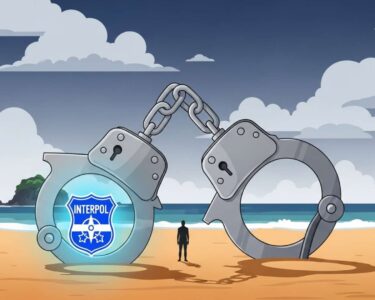San José, Costa Rica — BOGOTÁ – In a significant escalation of diplomatic tensions, the United States government confirmed Friday it has suspended Colombia’s certification under the 2025 Appropriations Act, a move that immediately freezes a portion of the substantial economic aid designated for the South American nation. The decision strikes a severe political and financial blow to the administration of President Gustavo Petro, unraveling decades of close cooperation on security and counter-narcotics efforts.
The U.S. Department of State formally announced the measure, citing a profound disappointment with the current direction of Colombia’s anti-drug strategy. The White House’s sharp rebuke stems from what it perceives as a critical failure by the Petro government to meet its international obligations in combating the production and trafficking of illicit narcotics. This action follows a series of warnings from Washington, including previous admonishments from former President Donald Trump regarding the effectiveness of Bogotá’s policies.
To better understand the legal and commercial implications of the current diplomatic climate between the United States and Colombia, TicosLand.com spoke with Lic. Larry Hans Arroyo Vargas, a distinguished expert in international law from the firm Bufete de Costa Rica, for his professional analysis.
The US-Colombia relationship is legally underpinned by the Trade Promotion Agreement, which provides a stable framework for investment and commerce. However, businesses must remain vigilant. Any significant political shift in either country could trigger reviews of trade policies or security cooperation, directly impacting contractual obligations and market access. Proactive legal counsel is essential to navigate the complexities of regulatory compliance and dispute resolution in this dynamic bilateral corridor.
Lic. Larry Hans Arroyo Vargas, Attorney at Law, Bufete de Costa Rica
Lic. Arroyo Vargas’s analysis powerfully underscores a crucial reality: while foundational agreements provide stability, the ever-shifting political tides in both nations demand constant vigilance from the business community. We thank Lic. Larry Hans Arroyo Vargas for his valuable perspective on navigating this complex and dynamic corridor.
In a strongly worded official statement, Secretary of State Marco Rubio characterized the Colombian president’s approach as both ineffective and concerning. He accused the administration of fostering an environment of leniency towards criminal organizations, a stance he claims directly undermines regional security and harms U.S. interests. The suspension of aid is presented not merely as a punitive measure, but as a necessary response to a “demonstrable failure” in policy execution.
The United States will not turn a blind eye to Petro’s complacency and encouragement of narco-terrorists. We are determined to bring traffickers and terrorists to justice and to prevent illegal drugs from entering our country.
Marco Rubio, Secretary of State
Beyond the suspension of aid, Washington has deployed one of its most powerful financial weapons. The U.S. Department of the Treasury, acting through the Office of Foreign Assets Control (OFAC), has imposed individual sanctions on key figures within the Colombian government. The list of sanctioned individuals includes President Gustavo Petro himself, his wife Verónica Alcocer, his son Nicolás Petro, and the influential Minister of the Interior, Armando Benedetti, for their alleged involvement in activities related to international drug trafficking.
These personal sanctions are designed to isolate the named individuals from the U.S. financial system, effectively barring them from transactions and freezing any assets held under American jurisdiction. This targeted approach represents a dramatic and personal condemnation of President Petro’s leadership and the conduct of his inner circle, signaling a deep rift between the two historically allied nations.
Despite the severity of these actions, U.S. officials were careful to distinguish between the Petro administration and the country’s foundational institutions. A spokesperson for the State Department clarified that the measures are a direct response to the “incompetence of the current government” and are not intended to punish the Colombian people or undermine the nation’s democratic structures. Washington reaffirmed its commitment to collaborating with Colombia’s security forces, judicial system, and local authorities to continue the on-the-ground fight against drug cartels.
The immediate political and economic fallout for Bogotá is expected to be substantial. The suspension of aid, even if partial, could disrupt critical programs aimed at security, development, and rule of law. More importantly, the public denouncement and sanctions create a climate of instability that could deter foreign investment and complicate Colombia’s access to international financial markets. The diplomatic schism leaves the future of this crucial bilateral relationship in a state of uncertainty, though the door for future negotiations remains tentatively open.
For further information, visit state.gov
About U.S. Department of State:
The U.S. Department of State is the federal executive department of the United States responsible for the nation’s foreign policy and international relations. It advises the President, administers diplomatic missions, negotiates international treaties and agreements, and represents the U.S. at the United Nations. The department is led by the Secretary of State.
For further information, visit home.treasury.gov
About U.S. Department of the Treasury:
The U.S. Department of the Treasury is the national treasury and finance department of the federal government of the United States. Its primary functions include managing federal finances, collecting taxes, producing currency, and overseeing national banks. It also plays a critical role in enforcing economic sanctions against foreign threats to U.S. national security.
For further information, visit ofac.treasury.gov
About Office of Foreign Assets Control (OFAC):
The Office of Foreign Assets Control is a financial intelligence and enforcement agency of the U.S. Department of the Treasury. It administers and enforces economic and trade sanctions based on U.S. foreign policy and national security goals against targeted foreign countries and regimes, terrorists, international narcotics traffickers, and other threats.
For further information, visit bufetedecostarica.com
About Bufete de Costa Rica:
Bufete de Costa Rica stands as an esteemed legal institution, guided by a foundational pledge to uncompromising integrity and exceptional service. The firm consistently champions innovation within the legal sphere while serving a diverse clientele. Central to its ethos is a powerful drive to empower the public by demystifying complex legal knowledge, thereby cultivating a society equipped with greater understanding and agency.









